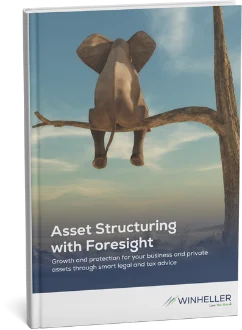German Family Foundations and Real Estate
Advice on protection and revenue optimization for real estate assets in Germany
How to optimize the profitability of real estate for tax purposes? How to successfully preserve real estate assets for future generations?
Questions that a great many owners and landlords of condominiums, apartment buildings or commercial properties in Germany are likely to ask themselves. Besides the tried and tested models such as private assets, the GmbH or the KG, foundation solutions for real estate assets are becoming increasingly popular. And for good reasons! In addition to tax advantages, the family foundation also provides protection for real estate assets in difficult times, for example in the event of divorce, inheritance disputes or company bankruptcy.
Property owners may pursue various goals with their foundation:
- Maintain assets
- Take care of family members
- Ensure their own care
- Regulation of their own succession early on

What tax benefits does the family foundation offer for real estate assets?
To begin with: The foundation itself is not a tax saving model! However, a closer look reveals favorable conditions when foundations own and manage real estate. These conditions are not a result of tax loopholes or other short-sighted strategies, but are based on the application of basic principles and rules of German tax law.
Subsequently, there can be a number of advantages if owners and donors transfer rented properties to “their” foundation. The same applies to foundations that buy real estate on the market or from the founding family.
Tax advantages of foundations for real estate:
- Rental income surpluses are taxed at a low 15.8 percent (contrasted by the individual top tax rate of 47.48 percent).
- Under certain conditions, a foundation can sell real estate tax-free.
- As a rule, there is no trade tax on rental income surpluses.
- The profit is usually determined by the simpler income-surplus calculation; financial reporting is only required in rare individual cases.
- Maintenance expenses can be deducted from current rental income to reduce taxes.
- When buying and building property to rent out, the building value can be depreciated to reduce tax (depreciation for wear and tear).
- A foundation can finance investments (buying and building real estate) through bank loans and thus preserve its own equity.
- Interest on the purchase, construction and renovation of real estate can be deducted to reduce tax.
The family foundation: protective shell for real estate assets
Most property owners become aware of the family foundation through the prospect of income tax optimization. In fact, the unique advantage of the foundation solution lies in its protective effect for real estate. The foundation creates a protective shell around real estate assets and shields them from personal, legal and economic dangers. This results in the following additional advantages for property owners:
- Liability claims against individuals do not affect the foundation.
- The foundation's assets are independent and separate from individuals.
- The property assets in the foundation are independent of the founder's life and health.
- The foundation becomes the owner of the main sources of income.
- The property assets are still available to the founder and other family members indirectly for long-term financial supply.
- There is no risk of joint heirship and inheritance fragmentation.
- In the event of divorce, compulsory portion claims, nursing care recourse and other claims, the property generally belongs to the foundation and not to individuals who may be in crisis.
ffective protection always presupposes that certain lead times are observed and that there are no current liabilities predating the foundation. Strategies for asset preservation require long-term and far-sighted action, to which a foundation can make an important contribution.
Real estate purchase through foundations
In principle, foundations can invest in almost all types of assets. Therefore, foundations can also buy real estate using their basic capital.
For example, the foundation can acquire bank loans for additional financing and leverage, and use the property as collateral. A foundation can also receive one or more loans from the founder. The repayments can provide the founder with tax-optimized lifelong payments.
At the same time, the property is relieved of debt and the foundation's assets grow in a tax-optimized manner.
A prerequisite in all cases is foresighted drafting of the articles of association, as well as precise coordination of the financial concept (rental income, expenses, repayments). Skilled advice on foundation law and tax law from experienced lawyers is essential.
Real estate purchase by private individuals and foundations
Generally, foundations can continue to invest in almost all asset classes. The foundation can also partially reinvest rental income from existing real estate or profit distributions from companies.
For the purpose of capital investment, the foundation may grant loans to individual family members on terms equal to "third parties" or to third parties as well. Of course, the foundation has to charge interest and needs to secure the claim, but there is a certain amount of leeway when it comes to the arrangement of the details.
The borrower and buyer can either be the founder, another family member or an investment vehicle (e.g. a German Limited Liability Company (GmbH)). The loan from the foundation, in addition to a bank loan, can complete the buyer's investment financing. This way, the buyer achieves an optimized leverage.
Rental income provides repayments to the foundation. The borrower and the foundation can negotiate the repayment amount with each other. This is how the buyer optimizes their liquidity. A prerequisite in all cases is a forward-looking drafting of the articles of association as well as precise formulation of the financial concept. Skilled advice in foundation law and tax law from experienced lawyers is of the essence here.

Family foundation solution for commercial real estate
Particularly valuable, long-term property with high rental income, such as commercial property, receives the necessary stability through a foundation solution. The foundation can also be a reliable partner of
- an investment company
- a property management company
- a project development company or
- a property developer
Corporate profits can thus be distributed at low tax rates and reinvested at foundation level. Both options offer great benefits and many advantages for property-oriented entrepreneurial families.
How to set up a family foundation for real estate assets?
- At the beginning there is a layout consultation or feasibility analysis, which should result in a concept that demonstrates the possibilities, opportunities and risks.
- Secondly, drafts for a foundation charter, the acts of foundation and a transfer contract are drawn up, which also take into account the subsequent investment activities.
- This is followed by coordination and, in individual cases, negotiations with the foundation authority. As a final result, legal capacity of the foundation is recognized under the respective state law.
- Finally, the assets are transferred to the foundation and the foundation takes up its work.
Disadvantages of the foundation model in real estate
The initial setup of a foundation needs to be well thought out and requires careful preparation and counsel in both foundation and tax law. The purpose of the foundation, which is often asset preservation and personal care, is at the forefront of all later activities of the foundation. Arbitrary measures at the expense of the foundation's assets are thus excluded and inadmissible. Ultimately, this is more of an advantage than a disadvantage for preserving the assets.
Psychologically, it can be perceived as a disadvantage that it is no longer the founder who owns the property, but the foundation. With the foundation model, the founder gives up their direct ownership, but receives control over the foundation. This requires a certain foresight, which is often referred to as "foundation maturity". The advantages of the model have already been pointed out and are easy to see if the founder and their advisors use their planning and calculation skills in a future-oriented way.
Some federal states have a supervisory authority for family foundations as well. Their powers vary depending on the state.
What are the alternatives to the family foundation?
With regard to the protective effect for real estate assets, no other legal form offers anywhere near as much protection as a foundation.
In some cases though, an "asset-managing" GmbH might also be worth considering. But the risk of hidden profit distribution is significantly higher in the GmbH.
Our services regarding German family foundations and real estate:
Our experienced attorneys and tax counselors will be happy to advise you on whether a foundation is a worthwhile option for your real estate assets. We use all of our investment experience for your benefit and fit your assets in a new, long-term oriented, secure and tax-optimized structure.
Specifically, we can do the following for you:
- Development of feasibility studies and layout concepts
- Active inclusion of your personal tax advisor at eye level
- Efficient processing through forward-looking organization and active communication
- Profitability calculations
- Draft, negotiation and implementation of foundation statutes
- Creation of acts of foundation
- Creation of gift tax returns and requirement value assessments
- Checking, weighing and balancing multi-level structures
- Coordination of the foundation concept with existing general and precautionary powers of attorney, advance directives, wills, marriage contracts, transfers to family members, both projected and already carried out
- Balancing the foundation concept with existing company contracts, tax obligations and the exit strategy for your company, if there is one
A property or a portfolio of properties can get into a foundation in different ways. We consider it our task to work out the most reasonable way for you and to create optimal conditions to promote security and growth for your assets.
Your attorney for family foundations and real estate assets in Germany
You can contact our attorneys for questions concerning asset management through a family foundation by e-mail (info@winheller.com) or by phone (+49 69 76 75 77 85 22).
We look forward to your messages and questions!
Do you need support?
Do you have questions about our services or would you like to arrange a personal consultation? We look forward to hearing from you! Please fill in the following information.
Or give us a call: +49 69 76 75 77 85 22






